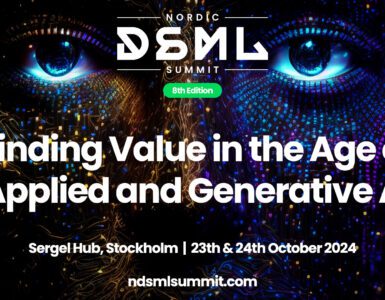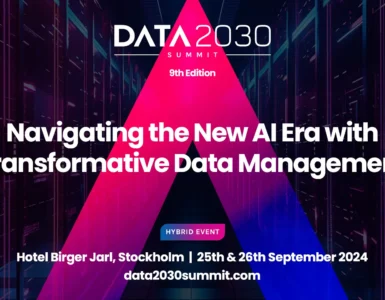Yet another fantastic edition of the biggest data, analytics, and AI event in the Nordics and beyond – Data Innovation Summit!
Spanning over two days, this hybrid event showcased cutting-edge insights. Experts in data, analytics, and AI showcased their expertise through world-leading case studies. This experience included both pre- and post-event activities, ensuring participants stay updated on the latest industry trends!
The Data Innovation Summit goes beyond numbers, emphasizing connection and collaboration. Attendees enjoyed not only a dynamic mix of presentations but also interactive workshops, and networking opportunities. All fostered an environment where innovation thrived! From AI-driven insights to revolutionary data analytics, this summit offered a comprehensive view of the latest trends and technologies.
Join us in this article for a retrospective journey, exploring the intersection of innovation and meaningful connections in a recap of this event!


Data Innovation Summit 2024: Nine Takeaways
1. Towards Human-Centric AI: The Human Aspect of Artificial Intelligence
Data and artificial intelligence are evolving towards a more human-centric approach. This evolution necessitates integrating diverse functions, including varied perspectives, promoting active communication, and adhering to ethical standards.
Moreover, the European AI Act aims to regulate AI for safety without stifling innovation. It underscores the importance of adopting responsible AI practices. This shift highlights the importance of human-AI collaboration, with AI systems designed to augment human capabilities while upholding ethical standards. Adopting responsible AI practices is less about complex laws and more about human-centricity and business common sense.
The demand for explainable AI (XAI) is increasing across all stages – from training data and algorithm design to validation and quality control. While there may be disagreements regarding the exact definitions of AI, most experts concur that AI exhibiting “human-like” capabilities meets the criteria. However, many aspects of human intelligence remain poorly understood. Consequently, the most sophisticated applications of AI, those that are most “human-like,” will face a significantly higher standard of explainability than most human-made decisions.
2. The GenAI Hype: Transforming Business with Generative AI
GenAI is everywhere, hence the demand for it continues to grow exponentially. Right now, the adoption of generative AI isn’t just a technological leap; it’s a cultural shift that demands managerial support and a pragmatic, business-centric approach.
Generative AI doesn’t have to be complex. It’s easy to start without huge investments. However, it requires commitment and focus. We must lower the barriers to experimentation. This journey isn’t just about algorithms; it’s about people, purpose, and progress.
3. AI in Action: Practical Artificial Intelligence and Collaboration
Cutting through the hype, the practicality of AI emphasizes the importance of starting with trusted and well-governed data. Through automated processes for data discovery, enrichment, and tracking/lineage, businesses can derive real value from AI. Therefore, trust in AI starts with trustworthy data.
Practical artificial intelligence focuses on the use of reliable, well-structured data to produce actionable insights. As a result, it contributes to substantial business value. Addressing the skills gap is vital, with a concentration on practical execution and the creation of business use cases.
Effective collaboration ensures that AI initiatives are not only technically proficient but also strategically aligned with business goals, maximizing their impact and value. This approach underscores the importance of collaboration and practical application in maximizing the value of AI initiatives.
4. Data Literacy is Non-negotiable!
In today’s data-driven business environment, data literacy is non-negotiable. Why? It’s imperative for all members of an organization to be able to comprehend and effectively utilize data for informed decision-making.
Moreover, the establishment of a corporate culture that bridges the gap between business domains and engineering is crucial for ensuring that data informs decision-making processes at every hierarchical level. This integration fosters data literacy throughout the organization, enabling employees to understand, interpret, and leverage data effectively.
5. Data as a Major Asset: Trust, Context & Human Judgment in Decision-Making
Trust and context are essential components in the data value chain. They play key roles in the transformation of raw data into actionable insights. Without trust in the data’s accuracy and relevance, its value diminishes significantly. Similarly, without the appropriate contextual understanding, data can easily be misinterpreted, leading to flawed decisions.
It is not data that makes decisions, but rather individuals who interpret and apply this data, leveraging their expertise and insight.
While expanding the data pool is crucial for a comprehensive analysis that yields actionable insights, it’s equally important to remember that data alone doesn’t tell the whole story. Human judgment remains paramount in data-driven decision-making because skilled interpretation and contextual understanding are necessary to navigate the nuances and complexities within the vast amount of information.
6. Clear Data Ownership & Robust Data Governance
Establishing clear data ownership and implementing robust data governance are fundamental prerequisites for both safe and effective deployment of artificial intelligence. Without proper data governance and quality assurance, artificial intelligence systems are likely to yield suboptimal results and potentially lead to inaccurate decisions.
Therefore, it is crucial to align the lifecycle of data, software, infrastructure, and metadata to ensure effective governance. This alignment facilitates a more efficient and reliable operation of AI systems, thereby enhancing their ability to generate accurate insights. This approach underscores the importance of data management in the successful implementation of AI technologies.
7. Rethinking Data Quality: Garbage In, Garbage Out
We all know garbage in, garbage out, whereas the quality of output is determined by the quality of the input.
AI, and GenAI in particular, can be a powerful tool to increase automation and effectiveness in many areas, but without solid architecture, high quality data and governance practices it is hard to scale it and the benefits remain limited. As Jennifer Daniell Belissent, PhD emphasized during one of the keynote sessions, the importance of data governance, foundation, and quality cannot be overstated for the future of applying effective AI.
Many practitioners now recommend adopting DataOps practices, which provide a systematic approach for monitoring, validating, and ensuring data quality. By implementing strong data governance and quality assurance measures, organizations can enhance the reliability and effectiveness of their AI systems, ensuring that they produce valuable insights rather than spurious results.
8. Embedding Data & AI Strategy within Business Strategy
The strategy for data and artificial intelligence should be seamlessly integrated into the overall business strategy, underscoring its key role in driving business growth and innovation. The design of data and AI operating models should be geared towards fostering collaborative governance, ensuring that all stakeholders have a voice in decision-making processes.
Moreover, effectively managing expectations requires a realistic perspective on data and AI capabilities. Establish partnerships with reputable data and AI solutions providers and promote a culture of experimentation. This fosters innovative approaches and continuous strategy refinement, ensuring a balanced and pragmatic implementation of Data & AI strategies.
9. Metadata Management and Data Contracts
Metadata is essential for ensuring the accuracy, performance, and contextual relevance of AI models. Moreover, data contracts serve as a cornerstone for maintaining data quality and consistency, especially within the framework of a data mesh strategy.
Implementing automated processes for metadata collection and optimizing metadata tagging procedures is highly recommended. This systematic approach to data management enhances the effectiveness of AI systems by ensuring data accuracy and consistency throughout the workflow.
Yet Another Remarkable Summit Draws to a Close!
The ninth edition of the Data Innovation Summit has drawn to a close, leaving us with a wealth of insights and inspiration! As we reflect on the event, it’s clear that the intersection of innovation and meaningful connections has never been more vital.
Let’s embed these key takeaways into our business strategies, ensuring that innovation guides our journey toward a data-driven future!
Data Innovation Summit 2025: Stay tuned for the 10th Edition!
Are you ready to experience the future of data-driven innovation at the upcoming edition? Because we’re already brewing something magical for 2025! Stay tuned and don’t forget to SAVE YOUR SPOT for Data Innovation Summit 2025!
For the newest insights in the world of data and AI, subscribe to Hyperight Premium. Stay ahead of the curve with exclusive content that will deepen your understanding of the evolving data landscape.















Add comment